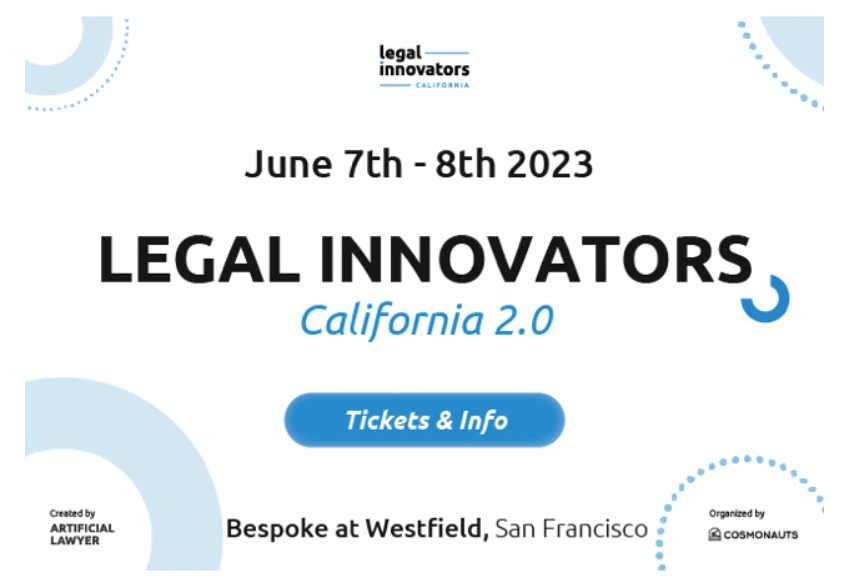
Starting a new series of profiles showcasing the speakers at the Legal Innovators California Conference this June 7 & 8 in San Francisco is Vedika Mehera, Innovation Advisor at Orrick.
—
– What is your role?
I am an Innovation Advisor at Orrick and split my time between internal and external initiatives. Internally, I work with our attorneys and teams across the firm to make their lives easier, more efficient, and more productive, while maintaining high quality and excellence. This includes identifying and implementing technology, ideating on legal solutions (including but not limited to process re-design, dashboarding, automation, and matter and project management), and helping drive change across the organization. Externally, I consult for our clients on their legal operations challenges and ways in which we can delivery legal services more effectively. I also manage the firm’s automation program, Wheelhouse.
– Why did you move into this field? When did you first hear the term ‘legal innovation’ and what did you think at the time?
After graduating college I moved to Boston to work for the Governor’s consumer protection office. During this time, I worked alongside a big law fellow whose firm had too many first years (like many others at the time). It was a daily reminder that the effects of 2008 were continuing to be felt across industries, and that legal was not immune. I had always wanted to be a lawyer and was still committed to that endeavor, but having had this experience, I was pursuing a JD with my eyes wide open and knowing that I wanted to do something different with it. I chose to go to Suffolk University Law School because they were coming out with a legal innovation and technology program and it was clear that they were on the leading edge of the kinds of skills lawyers of the future would need.
I took a handful of “alternative” classes in my 2L and 3L years (automation, project management, process improvement, etc.) and vividly remember sitting in one of those classes in my 3L year when it all just suddenly clicked in my head – I had this Aha! moment of what I wanted to do. Having had little experience in the area, I couldn’t exactly picture what the full-time job would look like, though through continued exploration and interviews I did figure out what I didn’t want it to look like (not all legal innovation jobs were innovating).
When the opportunity finally presented itself as my first big law job, I knew it was the beginning of many more to come. So, that is a long-winded way of saying that I’ve been in the innovation and operations space my entire career and can’t pinpoint exactly when I first heard the term itself. But the concept had become appealing to me while I was in law school.
– What is the most rewarding aspect of your job?
I love getting to work with everyone across all jobs, practices, and regions at the firm. Orrick is a big firm (and even bigger having just announced a merger!), which means that one day I may be working with our tech companies group on the east and west coast, and the next it could be our international arbitration practice across London and Europe.
I started my career mostly working in the transactional space, and since then have learned litigation, bankruptcy, employment and so much more in order to recommend, design and build effective legal solutions. It is really rewarding and exciting to work with some of the smartest people in the industry while learning something new every day. And that is true of the legal innovation and operations space as well – while constantly evolving, it is still in so many ways in its nascency. There is never a shortage of ideas to work on and challenges to tackle.

– If you looked into a crystal ball, how much do you think the everyday practice of law will change in the next five to ten years, especially given the changes in AI?
I think this is my cue to say ChatGPT! There is no doubt that with the latest LLM and GPT models, AI has finally reached a tipping point for which the everyday practice of a lot of things will change. As a starting point, much of what is and should be outsourced to alternative legal service providers (e.g., low risk, low value, routine work) will see sufficient change. So should in-house functions working on agreements such as supplier contracts, customer agreements, and employment agreements. Separately, there is of course a lot of opportunity to solve our access to justice problems.
For legal work that falls on the nuanced and complex end of the spectrum, given that we have just started playing with this new technology and until we can accurately assess where we are on the time scale (overestimating the present and/or underestimating the future), it is hard to predict what the speed of change will be and what it will look like.
At the very least, for technology in the research, drafting, and data extraction/analysis spaces, we’ll see AI do what we’ve been told it can do for the last 5-7 years (of which it has done some, but with a lot of training and even more data). This is because the barrier to entry is no longer as high – implementation requires lower effort, less data produces more accurate results, and the ability to scale just got a lot easier. As a result, one big change from where I sit is the ability for us to actually leverage, more widely, several types of AI technology with greater efficiency and success than we’ve been able to do up until now.
– What are the biggest challenges legal innovation now faces in the current climate?
Advances in technology are usually (eventually) accompanied by more and often stricter regulation, followed by additional burdens on the data privacy and security space (we recently established a global practice platform, Strategic Advisory and Government Enforcement (SAGE), to address the complex regulatory challenges we are seeing resulting from technology advances such as AI). So, as rapidly advancing AI technology continues to permeate different parts of our industry, it is also going to present new and more issues relating to lawyers’ ethical responsibilities, the use of client data, liability issues, discovery, etc. These are already challenges for legal innovation and depending on the outcomes of widespread use of generative AI, it’s unclear whether some of the barriers we face will get lifted or whether they’ll in fact become more stringent. Time will tell. But I remain optimistic that the best is yet to come for technology augmented lawyering.
– And what are the greatest opportunities now for change across the legal sector?
I think the greatest opportunities now are to heavily invest in data strategies that will no doubt impact one’s ability to leverage this new technology that is already exploding across the market, and to ensure that we use it as responsibly as possible.
– And finally, what advice would you give to anyone wanting to get into the field of legal innovation and legal tech?
Being able to wear different hats and pivot between different roles and perspectives is critical to success because change is hard and most people don’t like it. On the one hand, you need to keep up with an everchanging and frenetic legal tech market, and on the other, you need to be able to pick your priorities, make a plan, and commit to an effort that is most likely going to be slow and steady. And you often only get one chance to get it right, so finding that balance and maintaining it is a useful skill to have.
Equally important is to make friends and build trust with those whose practices you’re asking to change – it makes it much easier to ask someone to take time out of what might already be an 80-hour week to test a tool you are hoping that they’ll adopt. And, as a general rule of thumb, patience and a poker face never hurt anyone!
—
Many thanks to Vedika, who along with many other great legal sector experts will be speaking at the Legal Innovators California conference in San Francisco, June 7 & 8.
If you would like more information about the event please see here.
And to get tickets for the landmark legal innovation conference please see here.
